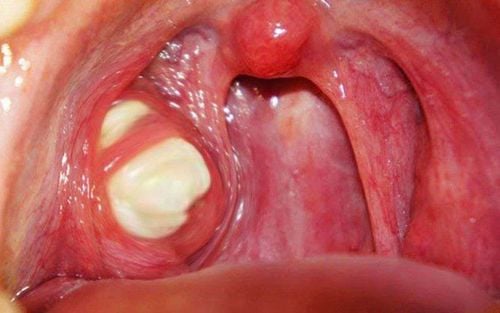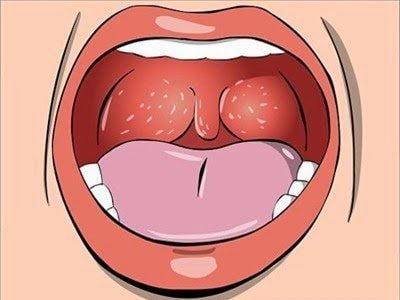This is an automatically translated article.
Tonsillitis is a seemingly simple disease that easily leaves consequences for children. In addition to the case of congenital enlarged tonsils, the condition of the tonsils being too large, the continuous swelling of the tonsils also warns of a serious level of inflammation, which should be overcome quickly otherwise it can lead to unpredictable complications.
1. The role of tonsils
The tonsils are one of the lymphoid (lymphatic) organizations in the nasopharynx. Including the organization of the tonsils of the palate (collectively referred to as tonsils), tonsils at the base of the tongue, tonsils in the nasopharynx (VA) and tonsils. These organizations, when a child is born in the first years of life, often have the effect of creating immunity to protect the body from the invasion of pathogens.2. Why do children often get tonsillitis?
Because the tonsils are the body's immune system, when pathogens enter the body, the tonsils will react to fight those agents. Tonsillitis is also a response of the body to cold, viral and bacterial infections... thereby creating antibodies to help the child's body form resistance. Children are also very sensitive to the weather, hot and cold temperatures..etc.
Virus là một trong những tác nhân gây bệnh viêm amidan ở trẻ em
3. What causes tonsils to be too large?
Oversized tonsils (also called tonsillitis) manifest when the amygdala tissue is abnormally large, which can lead to difficulty swallowing and breathing. Tonsillitis or enlarged tonsils is a very common condition in young children that can be congenital, genetic (congenital megaloblastic) but on the other hand can also be from the following causes:
Due to chronic tonsillitis : Too large tonsils are often the result of chronic tonsillitis but are not treated or treated improperly, for a long time it turns to complications of swollen tonsils causing enlarged tonsils. Due to inflammatory diseases in the respiratory tract: Some chronic diseases of the respiratory tract such as: Asthma, sinusitis, chronic rhinitis ... if not treated promptly can also cause disease. Inflammation in the mouth area such as tooth decay, gingivitis ... can also cause tonsils to become infected, swollen, and enlarged. Due to overgrowth of lymphatic organs: Some individuals have well-developed lymphatic system, so many lymph nodes in the neck and throat are overdeveloped, which weakens the immune system, creating conditions for viruses to easily penetrate, causing inflammation and the formation of tonsils. hypertrophy. Allergic reactions: Too large tonsils can also be the result of the body reacting to the environment, chemicals, and allergies. In some cases, cigarette smoke and air pollution can make the tonsils larger. Unsuccessful tonsillectomy: In some cases, unsuccessful surgical intervention of tonsils can cause the tonsils to become congested, swollen, and enlarged. Overall, the most common cause of tonsils is too much. Majority is due to recurrent disease and infection in and around the throat area. Because the tonsils produce antibodies to fight infections, when a child is sick, most of the time the tonsils will always be irritated and react louder than usual.
4. Signs of children with tonsillitis are too big
Excessively large tonsils often block the airways, affecting the child's breathing activities. Often children will have symptoms of snoring, shortness of breath, and sometimes sleep apnea. Such prolonged lack of oxygen also affects many different organs such as nerves, heart, lungs, abnormal development of the skull and face...
Amidan quá lớn sẽ gây tắc đường thở khiến trẻ thường ngủ ngáy
In general, the common signs of tonsillitis (too large tonsils) are:
Bad breath, the child's breath has an unpleasant smell The child often breathes through the mouth The child snores loudly while sleeping, even stopping sometimes breathing while sleeping. Children with anorexia, decreased interest in eating, inability to gain weight Frequently feel tired and weak Children with chronic ear infections (with hearing loss) Signs of recurrent sinus infections Frequent tonsils can cause many problems. Complications such as cellulitis, peritonsillar abscess, parapharyngeal abscess, posterior pharyngeal infection, glomerulonephritis, myocarditis, arthritis....
5. Treatment measures
To take care of a child with tonsillitis, parents can temporarily apply the following home remedies to make their child feel more comfortable:
Let the child breathe in steam to relieve nasal mucus and promote the immune system. Drainage system to improve breathing. Combine using warm salt water to gargle and improve throat discomfort. Salt water also works to stop the infection from spreading. Take raw honey (with antibacterial properties) and turmeric (anti-inflammatory properties) to make a paste and eat it 4 times a day to help reduce swelling and prevent further infections. Hypertrophy of the tonsils usually only requires treatment if the condition is too much to interfere with the child's activities (eating, sleeping, breathing...). However, if the enlarged tonsils are caused by an underlying infection, Parents can give their children antibiotics as prescribed by the doctor. If the enlarged tonsils are caused by allergies, using a corticosteroid spray into the nose or taking an antihistamine can be quite effective measures to relieve symptoms.
In addition, if the obstructive condition, sleep apnea tends to be severe, the family may consider having the child undergo tonsillectomy (tonsillectomy). This is a simple procedure performed under general anesthesia, the child goes home the same day and makes a full recovery in 7-10 days.
Vinmec International General Hospital is a prestigious and high-quality hospital system in examination, diagnosis and treatment of problems related to ENT, including tonsillitis. Customers who need advice or support from high quality services from Vinmec, please contact to book an appointment HERE.
MORE:
At what age is acute tonsillitis common? Guidelines for taking care of children after tonsillectomy Tonsillectomy and curettage with the latest generation Coblator: Less pain, less bleeding













